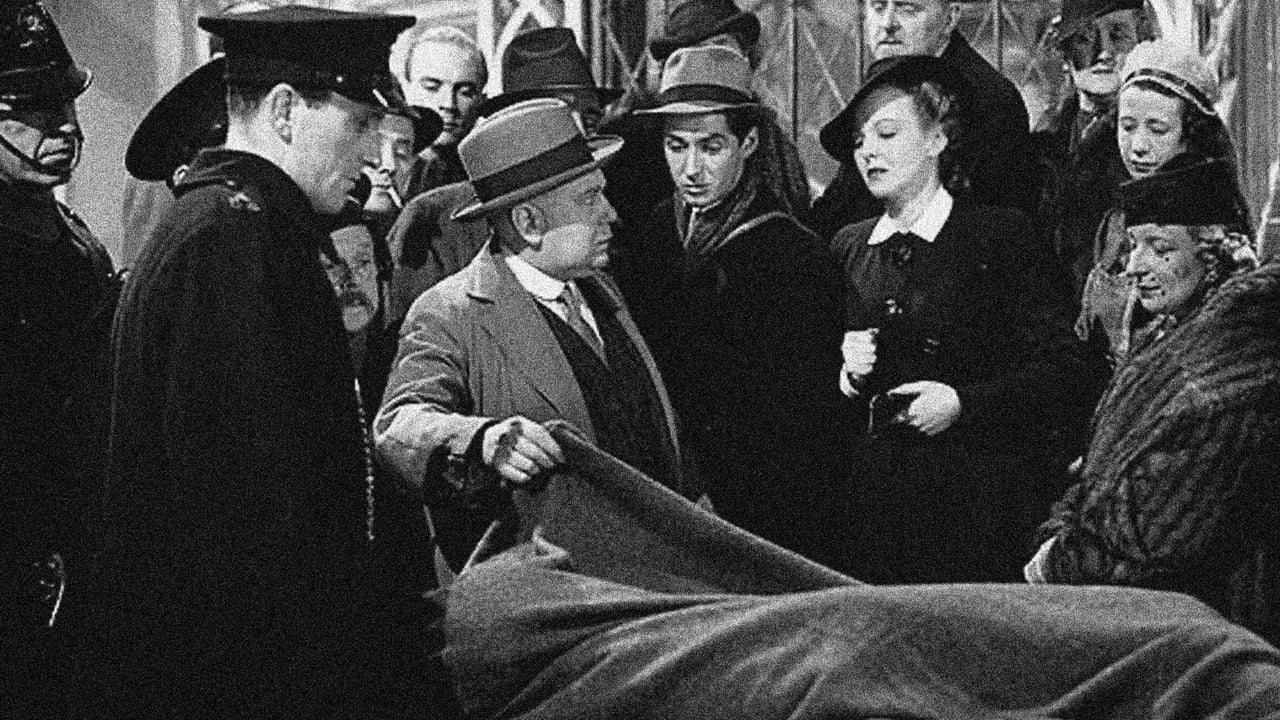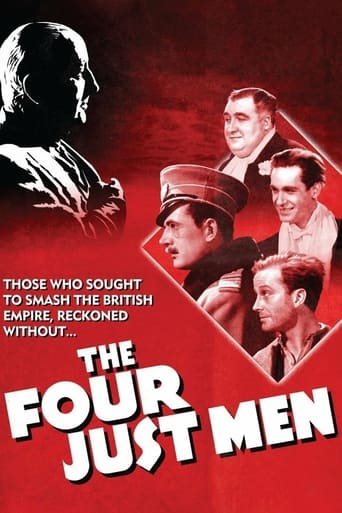



Well Deserved Praise
Good story, Not enough for a whole film
Good start, but then it gets ruined
Just intense enough to provide a much-needed diversion, just lightweight enough to make you forget about it soon after it’s over. It’s not exactly “good,” per se, but it does what it sets out to do in terms of putting us on edge, which makes it … successful?
View MoreThis is a fast-moving thriller with a lot of merit. Anna Lee shines in her role as a young woman reporter in London, who's eager to get on a crime beat, and in particular to investigate the "Four Just Men," a secret quartet of vigilantes who dispense their own justice, up to and including the coup de grace, to baddies. Her scenes in the newsroom with an editor and another reporter are fun to watch.The film benefits from the presence of other fine British actors. Francis L. Sullivan, an A-1 performer who appeared in the 1940s classics "Oliver Twist and "Great Expectations," has a big part here. The film has good banter between Anna and Griffith Jones; they were also paired in "Young Man's Fancy," that same year. You can tell money was spent on this production: the scenes in Parliament look very authentic, and the exterior of Parliament too. All the sets are very good with a nice 1930's feel. There is a great print of this film on Ealing Studios Rarities Collection, vol. 2. It's pal format, so you'll need a region free DVD player if you're in the USA, like me.
View MoreIn his 1940 review of this film for the New York Times, critic B. R. Crisler unenthusiastically described the 1939 film adaptation of Edgar Wallace's 1905 novel THE FOUR JUST MEN as being both "infected with the virus propagandistus" and as an "espionage melodrama". Considering the tone and subject of the film and the popular sentiment in the United States at the time, this description is hardly surprising. In the summer of 1939, the growing threat of Nazi Germany was clear to all in Europe who wished to see it. Hitler had already conquered Austria and Czechoslovakia and the invasion of Poland, the beginning of World War II, was only months away. In such dark times the motivation behind a film about four men, dedicated to the cause of justice and determined to prevent Great Britain from allowing itself to fall to the Nazi war machine is wholly understandable.The four just men of the title are vigilantes, acting outside the law, their identities secret, who have devoted themselves, for reasons never revealed in the film, to fighting crime, tyranny and injustice wherever they find it – mostly in Europe and America apparently. The group is comprised of actor extraordinaire Humphrey Mansfield (Hugh Sinclair), playwright James Brodie (Griffith Jones), Léon Poiccard (Francis L. Sullivan) the successful owner of a exclusive fashion house and foreign correspondent James Terry (Frank Lawton). In the opening sequence, Terry is rescued by his comrades from a Prussian prison where he is moments away from being executed as a spy. Terry escapes with information that a highly placed fifth columnist inside the British government is laying the groundwork for some kind of attack against the United Kingdom. The murder of Myra Hastings (Lydia Sherwood), the wife of a Foreign Office official, leads the Just Men to discover that the Nazi agent is the popular MP Sir Hamar Ryman (Alan Napier) and that the endgame of the enemy plot is nothing less than the invasion and conquest of Great Britain. With only days left until the plan reaches fruition, the race is on to bring down Ryman and save the empire.The glaring political elements aside, the film plays out like a standard B movie adventure romp. Hugh Sinclair demonstrates he is every bit the actor Mansfield is supposed to be, slipping in and out of characters and disguises with a skill that would leave even Rollin Hand envious. Sullivan is both charming and forceful as the leader of the group and Jones is likable enough as the film's romantic lead, trying to keep eager girl reporter Ann Lodge (Anna Lee) off the track as she edges closer and closer to the truth behind the death of Myra Hastings and the hidden identities of the Four Just Men. Only Lawton is underutilized, his character spending much of the film abroad, and therefore off screen, digging up vital details about the enemy plot.The film is so obviously an unsubtle warning about the dangers of Nazi appeasement that it cannot escape being labeled as a propaganda film. While the message it champions seems unsurprising today, one must remember that it had only been less than a year since Chamberlain's "peace in our time" speech and that in the United States rules were firmly in place to prevent criticism of Hitler's Germany in Hollywood produced films. But on December 7, 1941 all that would change and Hollywood itself would soon after become the greatest producer of anti Nazi propaganda in the world. Deeming THE FOUR JUST MEN as being "espionage melodrama" is also not inaccurate. But in this too was the film ahead of its time. With the arrival of the Cold War in the 1950s the "espionage melodrama" would come into its own, eventually leading to James Bond and the spy craze of the 1960's.Never having been released on video or DVD the film is a difficult one to see, but certainly worth the effort if the opportunity arises. It is neither great art, nor great cinema, but it is an entertaining adventure yarn, and a lasting note of a precarious era in modern history.
View MoreI don't tend to spend time having a go at other reviewers on this site as we are all entitled to our opinions.however how on earth can you post a review on a film when you have never seen it.Also to say that Edgar Wallace is forgotten is to say the least controversial,given his contribution ,if any,to King Kong.The thing about Wallace is that he knew when he was on to a good thing.Unknown masterminds.killing.robbing,a law unto themselves.The Frog,The squeaker etc.If a formula works then just use it again.Here Michael Balcon reuses it just as the country is on the verge of war.At the beginning of the film,the identity of the captors is not revealed.however the film ends with a climactic speech aimed fairly and squarly at Hitler.. So this film starts out as a political thriller and ends up as a morale boosting flag waver.
View More